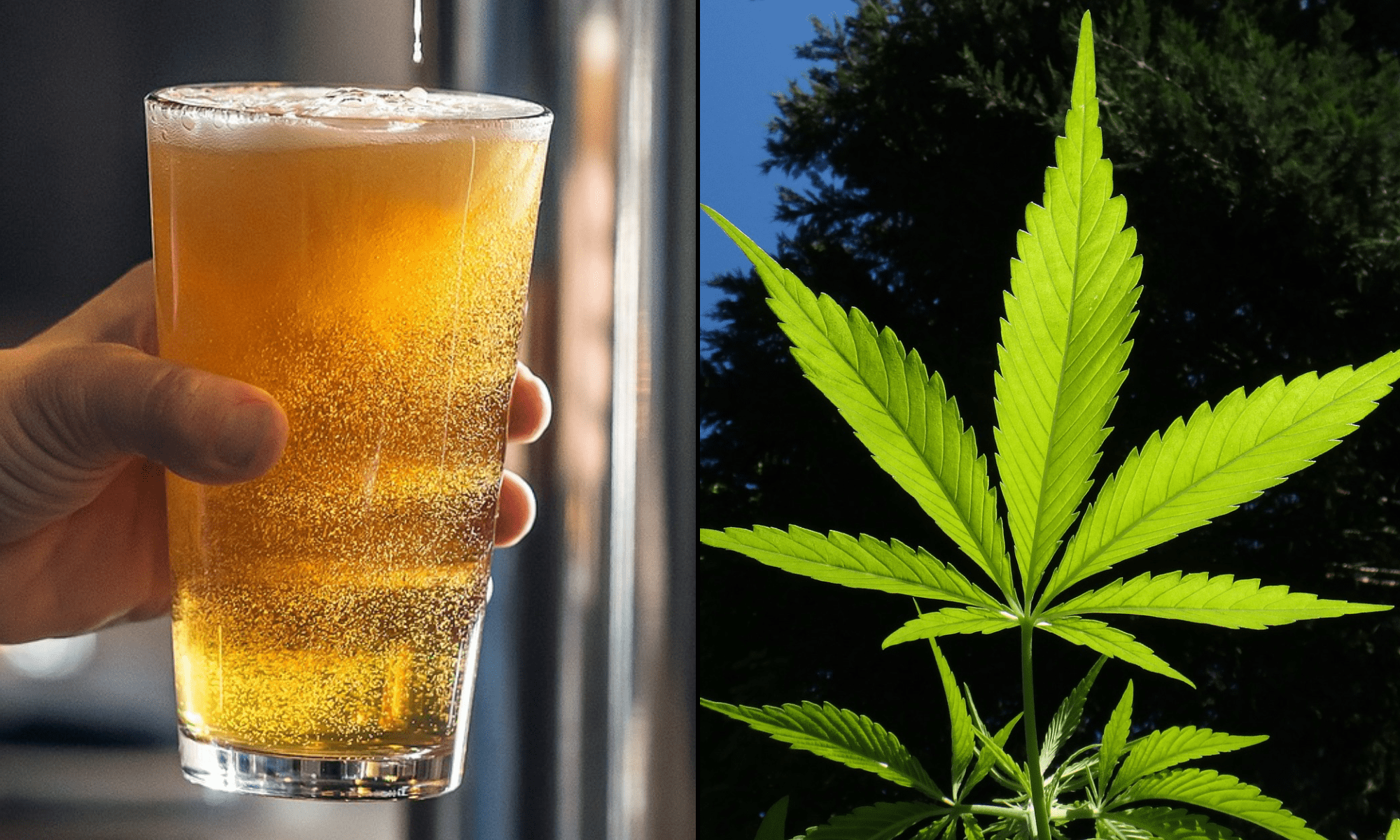featured
Lawyer Alerted New York Regulators of Noncompliant Dispensary Location in March 2024
Published
2 weeks agoon

New York’s cannabis industry got sent into another whirlwind on July 28, when regulators informed 152 retail businesses that their dispensary locations were located too close to schools and did not comply with state law.
These businesses range from medical cannabis dispensaries like FLUENT-owned Etain’s Manhattan location that opened in 2020 to Housing Works Cannabis Co.’s Manhattan location on Broadway that was the state’s first adult-use dispensary to open in December 2022. Dozens of others have unknowingly opened in noncompliant locations in 2023, 2024 and 2025.
Under state law, licensed cannabis sites must be at least 500 feet from schools and 200 feet from churches or other houses of worship. However, the New York Office of Cannabis Management (OCM) established guidance in 2022 that state regulators now say was incorrect, impacting 108 already opened storefronts and 44 pending applicants who accomplished one of the most difficult feats in the capital-deprived industry: securing real estate.
Specifically, the OCM erroneously recommended to the state’s Cannabis Control Board (CCB) that dispensary locations were compliant under state law if their entrances were 500 feet from a school building or if they were located on a different road than a school, even if that school was within 500 feet.
“The two entities must be located on the same street for the 500-foot requirement to be applicable,” according to the OCM’s previous guidance.
However, one industry lawyer attempted to point out to OCM officials more than a year ago that their calculation of measuring from a school building/entrance versus a school boundary was improper (more on this below).
Now, OCM officials are saying they borrowed their 2022 guidance on school proximity measurements from municipalities and that it should never have applied to the office’s statewide location assessments. And when a regulation conflicts with a state statute, the statute reigns, according to the OCM.
In issuing a proximity correction on July 28, OCM officials said they will now assess the 500-foot distance from the main entrance of a dispensary location to the nearest property line boundary of a school’s grounds.
“I am keenly aware that this information will have repercussions for you, your business and your community,” OCM Acting Executive Director Felicia A. B. Reid wrote in a letter to the 152 impacted businesses. “You have poured your energy, time, savings, dedication and heart into the promise of New York’s cannabis industry. To give you this news, and for the weight of it, I am incredibly sorry.”
Despite the apology, the 44 pending dispensary applicants impacted by the OCM’s miscue now must find new locations before moving forward in the application process.
Meanwhile, the 108 dispensaries that are already open are now at the mercy of state lawmakers for a legislative fix to address the zoning issue, perhaps by grandfathering their locations in—something the OCM and Gov. Kathy Hochul are pushing for. But nothing’s guaranteed.
“I’d like to do that, yes,” Hochul said of grandfathering in the 108 stores during an interview with NY1’s Spectrum News. “I don’t want them hurt. They’re part of our community already, they’re working hard, they waited a long time for this, and, basically, I don’t want them screwed.”
While the 108 dispensaries technically can’t renew their licenses until a legislative fix arrives, they can submit their renewal application and remain open while the application is under review, as long as they are in good standing with the state. State regulators may prolong their review process until the New York Legislature reconvenes next January.
Hochul said the OCM’s erroneous guidance on school buffer zone measurements was exposed during a recent audit.
Reid, who took over as the OCM’s acting executive director in June 2024, said the OCM’s blunder was uncovered after she directed the office to conduct a thorough review of its practices to ensure compliance with mandates of the Marijuana Regulation and Taxation Act (MRTA), including decision-making protocols incorporated under former OCM Director Chris Alexander.
Alexander resigned in May 2024 after criticism from Hochul, who appointed him to the position in September 2021 but was later unforgiving of the adult-use program’s slow rollout.
No matter who’s at fault for the OCM’s school proximity misguidance, Cannabis Business Times has learned that state regulators could have corrected the issue more than a year ago.
Jeffrey Jensen, a California and New York lawyer who founded the Variscite companies that sued OCM multiple times in the past, alerted OCM officials to the school measurement problem in March 2024.
In multiple emails to the OCM shared with CBT, Jensen informed the OCM that it had improperly approved a specific dispensary location where “the school grounds take up the entire block” and fall within 500 feet of the dispensary, even though the school’s “primary entrance” was farther than 500 feet and on a different street.
While the OCM responded through its [email protected] domain to let Jensen know that the office staff reviews locations upon license application submissions, Jensen later copied an attorney who was on OCM’s staff at the time but has since left the office.
Jensen’s emails to the OCM cited statutes that he said made the OCM’s method of calculating the distance unlawful. One statute, in particular, that Jensen cited in the March 2024 emails pointed to “school grounds” being a term that’s defined in New York’s education law, meaning “any building, structure [or] surrounding outdoor grounds.”
On July 28, 2025, the OCM referenced this same term and also stated how it’s defined in the state’s education law to justify its corrective action.
In other words, even though there was a leadership transition after the March 2024 email exchanges with Jensen, another 16 months passed before the OCM corrected its misguidance on the school proximity measurement.
Cannabis Business Times reached out to the OCM, asking why it took the office 16 months to rectify the misguidance.
“It did not take OCM 16 months,” OCM Press Secretary Taylor Randi Lee said.
“The current OCM lead was not aware of the issue until recently,” Lee said. “Regulations that explained how measurements would be taken were published in 2022 and adopted in 2023. It was under these that OCM, under the leadership in place at the time, recommended to the CCB [the] licensure of the first retail stores. Some of these stores opened at locations that violated the law, meaning within 500 feet of the grounds of nearby schools. This is why some of the first opened stores appear on the list of locations facing the school proximity issue. Current OCM leadership, which assumed their roles in June 2024, recently discovered this error and have now moved to bring the agency’s licensing practice in line with the obligations of Cannabis Law.”
Since that March 2024 email chain, the OCM has approved dozens of adult-use dispensary licenses, with at least 47 stores opening in noncompliant locations after Jensen alerted the OCM of his concerns with the office’s proximity measurements. At least 40 of these stores opened after the new leadership took over the reins at the OCM.
“The governor’s office and OCM remain committed to supporting impacted licensees, with the goal of keeping them operating in their current locations through a legislative change,” Lee said. “We look forward to working with the licensees and the Legislature in the coming session.”
On top of buffer zones, dispensary operators generally are tasked with finding locations in commercial or manufacturing zoning. Also, their retail facilities are severely limited by mortgages because federal banks can’t have tenants operating federally illegal businesses, or they risk dealing with money laundering issues under cannabis’s Schedule I control status in the U.S.
This presents a challenge for cannabis businesses because the vast majority of commercial properties in the U.S. have mortgages, especially when a business has investors who don’t want 100% of their money tied up in a property that prevents them from leveraging other properties or assets.
And specifically burdensome in New York’s cannabis market, Manhattan, Brooklyn and Queens represent some of the most expensive real estate markets in the country, with few options left for dispensaries to relocate nearby.
Particularly, 89 of the 108 impacted dispensaries that opened too close to schools are operating in New York City. Absent a legislative fix, these operators could have to close their doors and move outside the city.
“It’s a nightmare for these people. I don’t think the government has any idea what this does to people,” Jensen said. “The hardest part of this business, I always tell people … comes down to two things: property and money, with a heavy emphasis on property. It is exceptionally hard to find properties.”
Had the OCM heeded Jensen’s warning in March 2024, state officials could have potentially saved at least some of the impacted operators from the uncertainties they now face.
OCM officials announced on July 28 that they’re working with Hochul’s office and the Empire State Development to create a $15 million relief program for the 44 pending applicants impacted by the misguidance, allowing up to $250,000 each in coverage; however, that may not be enough to remedy the damage.
The ripple effect of these businesses having to find new locations disrupts the order of who was placed and when. Some may argue that their backup location is no longer available: In addition to schools and places of worship, licensed dispensaries also have buffer zones between other licensed dispensaries based on municipal populations in New York.
While New York vertically integrated medical cannabis operator Curaleaf was not among the impacted businesses, Chairman and CEO Boris Jordan sounded off on his frustration with the situation.
“The small business owners who have spent the past two years building New York’s adult-use industry into a diverse, thriving market are threatened with millions in damages and potential shutdown,” he wrote on X. “This is a catastrophic failure of governance. We believe the OCM blatantly and knowingly disregarded the MRTA’s proximity provisions, violating both state and federal law on multiple bases. Dispensaries and their owners should not suffer due to the intentional disregard for the law by the OCM and the administration. The state must be held accountable.”
When New York state cannabis regulators deviated from measuring the 500-foot school buffer zone to the nearest school property lines in 2022, and detailed those revised regulations in May 2023, the change was required to be reviewed by Hochul’s administration, The New York Times reported.
Jordan said that instead of New York reaching its market potential, he believes the state’s “reckless” decisions have driven consumers back to the unlicensed market.
The CEO said that his company’s wholesale partners are among those impacted and that Curaleaf plans to fight “this lawlessness.”
“We hear their anger,” he said. “We share it.”

Author: mscannabiz.com
MScannaBIZ for all you Mississippi Cannabis News and Information.
You may like
-


New Mississippi vape law takes effect in October, only FDA-authorized products allowed
-


More Young Adults Are Opting For Cannabis Drinks Over Alcohol At After-Work Happy Hours, Poll Shows
-


How AI Is Changing The Cannabis Industry
-


12 New York Cannabis Businesses Sue State Over School Proximity Fiasco
-


Massachusetts Auditor Notes ‘Violations’ and ‘Mismanagement’ At Cannabis Control Commission
-


Supreme Court Gives Marijuana Companies More Time To File Petition In Case Challenging Federal Prohibition
featured
More Young Adults Are Opting For Cannabis Drinks Over Alcohol At After-Work Happy Hours, Poll Shows
Published
38 minutes agoon
August 18, 2025
Younger Americans are increasingly using cannabis-infused beverages as a substitute for alcohol—with one in three millennials and Gen Z workers choosing THC drinks over booze for after-work activities like happy hours, according to a new poll.
The survey from Drug Rehab USA assessed the recreational preferences of 1,000 employed adults, finding more evidence that as the marijuana legalization movement achieves greater success and as awareness of alcohol-related harms has spread, a significant portion of those generations are opting for cannabis over booze.
All told, 66 percent of American adults say they’ve tried alcohol alternatives over the past six months. And 24 percent of respondents said they’ve “at least partially” replaced alcohol with non-alcohol or cannabis-based drinks.
That trend is being led by millennials and Gen Z, one of three of whom said they used THC beverages instead of alcohol drinks.
“To unwind after work, 45 percent drink alcohol, while 24 percent use nicotine, 20 percent turn to cannabis, and 16 percent choose alcohol alternatives like mocktails, non-alcoholic beer, or CBD,” the survey found.
“When it comes to winding down after a long day, Americans are reaching for a mix of familiar comforts and emerging alternatives,” Drug Rehab USA said. “While alcohol still dominates, the competition between nicotine and cannabis shows how habits are evolving across generations.”
“After-work rituals are no longer limited to a nightly drink—or even to alcohol at all. From THC-infused beverages to nicotine pouches and non-alcoholic alternatives, today’s habits reflect a broader redefinition of what it means to unwind. While motivations vary—stress, routine, social connection—the through-line is clear: Americans are turning to consumable rituals to draw a line between work and rest. For many, those rituals begin within the hour and recur multiple times a week.”
The survey findings largely track with other research assessing emerging trends in cannabis and alcohol use.
For example, a recent rodent study determined that the cannabinoid CBD reduces rates of binge drinking and alcohol blood concentrations.
Results of a separate study published in the journal Molecular Psychiatry also indicated that a single, 800-milligram dose of CBD can help manage certain alcohol cravings among people with alcohol use disorder (AUD), supporting the use of the marijuana component as a potential treatment option for problem drinkers.
Federally funded research into the effects of cannabis on alcohol use that was published in May also found that people who used marijuana immediately before drinking subsequently consumed fewer alcoholic beverages and reported lower cravings for alcohol.
The study follows a separate survey analysis published in March that found that three in four young adults reported substituting cannabis for alcohol at least once per week—a “fast-emerging” trend that reflects the “rapid expansion” of the hemp product marketplace.
The report from Bloomberg Intelligence (BI) found that, across various demographics, cannabis is increasingly being used as an alternative to alcohol and even non-alcoholic beverages as more companies—including major multi-state marijuana operators (MSOs)—expand their offerings.
The findings were largely consist with a growing body of studies indicating that cannabis—whether federally legal hemp or still-prohibited marijuana—is being utilized as a substitute for many Americans amid the reform movement.
An earlier survey from YouGov, for example, found that a majority of Americans believe regular alcohol consumption is more harmful than regular marijuana use. Even so, more adults said they personally prefer drinking alcohol to consuming cannabis despite the health risks.
A separate poll released in January determined that more than half of marijuana consumers say they drink less alcohol, or none at all, after using cannabis.
Yet another survey—which was supported by the National Institute on Drug Abuse (NIDA) and released in December—found that young adults are nearly three times more likely to use marijuana than alcohol on a daily or near-daily basis.
That poll provided more granular, age-specific findings than a similar report published last year, finding that more Americans overall smoke marijuana on a daily basis than drink alcohol every day—and that alcohol drinkers are more likely to say they would benefit from limiting their use than cannabis consumers are.
A separate study published in the journal Addiction last year similarly found that there are more U.S. adults who use marijuana daily than who drink alcohol every day.
In December, BI also published the results of a survey indicating that substitution of cannabis for alcohol is “soaring” as the state-level legalization movement expands and relative perceptions of harm shift. A significant portion of Americans also said in that poll that they substitute marijuana for cigarettes and painkillers.
Another BI analysis from last September projected that the expansion of the marijuana legalization movement will continue to post a “significant threat” to the alcohol industry, citing survey data that suggests more people are using cannabis as a substitute for alcoholic beverages such a beer and wine.
Yet another study on the impact of marijuana consumption on people’s use of other drugs that was released in December suggested that, for many, cannabis may act as a less-dangerous substitute, allowing people to reduce their intake of substances such as alcohol, methamphetamine and opioids like morphine.
A study out of Canada, where marijuana is federally legal, found that legalization was “associated with a decline in beer sales,” suggesting a substitution effect.
The analyses comport with other recent survey data that more broadly looked at American views on marijuana versus alcohol. For example, a Gallup survey found that respondents view cannabis as less harmful than alcohol, tobacco and nicotine vapes—and more adults now smoke cannabis than smoke cigarettes.
A separate survey released by the American Psychiatric Association (APA) and Morning Consult last June also found that Americans consider marijuana to be significantly less dangerous than cigarettes, alcohol and opioids—and they say cannabis is less addictive than each of those substances, as well as technology.
Meanwhile, a leading alcohol industry association is calling on Congress to dial back language in a House committee-approved spending bill that would ban most consumable hemp products, instead proposing to maintain the legalization of naturally derived cannabinoids from the crop and only prohibit synthetic items.

Author: mscannabiz.com
MScannaBIZ for all you Mississippi Cannabis News and Information.

AI is bringing changes and advancements to most industries – including cannabis
Whether you are a doctor in Nebraska, a restauranteur in Baltimore or senior engineer in Bellevue, Washington, it is upending how you do your job – both good and bad. Most areas of life are being touched and here is how AI is changing the cannabis industry. Artificial Intelligence (AI) is quietly reshaping nearly every corner of modern life, and the cannabis industry is no exception. From cultivation and retail to consumer transparency, AI is bringing new efficiency, accuracy, and trust to a market long been clouded by misinformation and stigma.
RELATED: Marijuana Might Be A Better Hurricane Party Guest
One of the most visible changes is how AI helps consumers track cannabis products. In an industry where strain names and effects can vary widely, AI-driven platforms are stepping in to provide clarity. Apps now use AI to analyze lab results, customer reviews, and even chemical profiles to match consumers with products best suited to their needs—whether it is better sleep, anxiety relief, or a more social buzz. Instead of relying on word-of-mouth or vague descriptions, consumers can access personalized recommendations grounded in hard data.

AI is also helping consumers find accurate, verifiable information in a marketplace which has sometimes struggled with exaggerated claims. Machine learning models can scan thousands of lab tests, regulatory filings, and scientific studies to identify trustworthy patterns. This gives guidance so customers are less likely to fall for marketing hype and more likely to discover which products are safe, effective, and compliant with state rules. For a generation used to researching everything from skincare ingredients to fitness supplements online, AI-driven cannabis insights are a welcome tool.
On the cultivation side, AI is revolutionizing how cannabis is grown. Smart sensors, combined with predictive algorithms, can monitor temperature, humidity, and light in real time. Farmers use these insights to maximize yield while minimizing water and energy use—an especially important consideration in an era of climate concerns and sustainability demands. By predicting plant health before problems arise, AI also reduces the need for pesticides and allows for more consistent harvests.
Retailers are benefiting as well. AI-powered inventory systems can predict which products will sell fastest, helping dispensaries avoid shortages or waste. Chatbots and virtual budtenders are guiding customers through product choices, mimicking the experience of a knowledgeable staff member but available 24/7 online. These digital assistants are especially appealing to Millennial and Gen Z consumers who prefer research-based shopping and minimal in-store pressure.
RELATED: Science Says Medical Marijuana Improves Quality Of Life
Looking ahead, AI could play a role in shaping cannabis policy and public health, too. By analyzing patterns in consumption data, researchers and regulators can better understand how cannabis affects communities, potentially leading to smarter regulations and safer use guidelines. In medical marijuana research, AI is proving especially powerful. Machine learning tools can process vast sets of patient data, clinical trial results, and genetic information to identify which cannabinoids or terpenes may be most effective for specific conditions such as chronic pain, epilepsy, or anxiety. This not only speeds up research but also helps doctors personalize treatment options for patients in ways not possible even a decade ago.
AI is doing more than making cannabis more high-tech—it’s making it more transparent, sustainable, and consumer-friendly. For an industry still overcoming decades of misinformation, which is a game-changing development.

Author: mscannabiz.com
MScannaBIZ for all you Mississippi Cannabis News and Information.
featured
12 New York Cannabis Businesses Sue State Over School Proximity Fiasco
Published
3 hours agoon
August 18, 2025
A dozen New York-licensed cannabis dispensaries are taking regulators to court over a screw-up by the state’s Office of Cannabis Management (OCM) related to their storefront locations being too close to schools.
The 12 petitioners filed the complaint on Aug. 15 in the New York Supreme Court in Albany County, against the OCM and the state’s Cannabis Control Board (CCB) over a school proximity correction that the office issued July 28. The correction, which impacts 108 dispensary licensees and 44 applicants with provisional licenses, intends to realign the OCM’s 500-foot measurement guidelines with state law.
Instead of continuing an entrance-to-entrance measurement between dispensaries and schools from the OCM’s erroneous 2022 guidance, the office now plans to measure the buffer zone from the entrance of a cannabis store in a straight line to the nearest property line boundary of a school’s grounds to move into compliance with New York’s cannabis law.
Following the proximity correction issuance, OCM Acting Executive Director Felicia A.B. Reid sent a letter on Aug. 6 to the 152 impacted businesses, clarifying that the 108 licensees may remain open or continue to work toward opening in their current locations as state officials push lawmakers for a legislative fix to grandfather in their locations. The 44 applicants, meanwhile, will need to move locations and will have access to $250,000 each from a $15 million relief fund to lessen their burdens.
Despite the assurance that the 108 licensees can remain put—and even continue to operate while the OCM delays reviewing any license renewals pending the legislative fix—the petitioners are asking the state Supreme Court in Albany to annul the OCM’s revised interpretation of Cannabis Law § 72(6) and declare that their locations remain compliant under a lawful reading of that law as well as the OCM’s 2022 guidance.
The 12 cannabis businesses are also asking that a State Supreme Court judge issue a preliminary and permanent injunction preventing the OCM from taking any enforcement actions against them based on the office’s new interpretation of the law, forcing the OCM to instead keep its previous interpretation that regulators used to review and approve site plans to issue licenses.
“Relying on those approvals, petitioners poured their life savings into launching their businesses,” the complaint states. “They signed leases, completed build-outs, hired employees and opened their doors to the public under the state’s very detailed framework. But now, in a complete about-face, OCM incredulously claims it got the law wrong all along.”
Furthermore, the petitioners claim that the OCM changed its guidance based on a new interpretation of the law without any formal rulemaking process or public notice. They argue that the informal rulemaking violates the State Administrative Procedure Act and that state officials arbitrarily redefined their own regulations.
Seven of the 12 businesses suing the state are either open or have received their final licensure to open, meaning the state has assured them they do not need to move locations and can remain open even with expired licenses—the OCM indicated it cannot approve their license renewals until state lawmakers act. However, some businesses fear that insurance companies and banks may refuse to service them if their licenses have expired, even in an interim phase.
“Petitioners face numerous collateral consequences as a result of OCM’s unlawful reinterpretation of Cannabis Law §72(6),” the complaint states. “Specifically, petitioners are required as part of their leases to be in compliance with all cannabis laws. OCM’s arbitrary and capricious actions have placed them at risk of falling into material breach with their lessors and, if allowed to continue, will cause them irreparable harm.”
These seven businesses include: ConBud (Manhattan), The Cannabis Place (Queens), Summit Canna (Bronx), Hush (Bronx), High Fade (Manhattan), Housing Works Cannabis Co. (Manhattan) and Common Courtesy Dispensary (Queens).
Meanwhile, the other five petitioners in the lawsuit are cannabis business applicants who received provisional licenses that are not yet finalized and will therefore be forced to pack up and change locations. These businesses include: Rezidue, Elise Pelka, Toastree, Monarch NYC and Luxe Leaf Boutique.
According to the lawsuit, while each of the five applicants has incurred significant buildout expenses, Rezidue, Elisa Pelka and Lux Leaf Boutique have completed their buildouts and were ready to begin operating upon a virtual inspection and gaining final licensure.
The petitioners’ construction costs ranged from $500,000 to $1,000,000, falling short of the $250,000 available per applicant in the state’s relief fund, according to the lawsuit.
“Petitioners have each expended nearly and in some cases over $1 million in preoperational expenses, and several million dollars each in post-operational expenses in reliance of OCM’s assurances,” the complaint states. “If OCM’s new and unlawful interpretation is allowed to remain in force, petitioners will also lose hundreds of thousands of dollars in deposits and lease termination penalties that cannot be recouped.
“Additionally, petitioners have all executed personal guarantees on their commercial leases, which would not only bankrupt the businesses, but also the individuals who guaranteed these leases.”
The petitioners argue that these expenses represent irreparable harm, which the court has the authority to prevent.
Other arguments the 12 cannabis businesses made in the lawsuit include:
- Retroactively revoking their license rights without notice or hearing violates due process;
- The OCM violated the equal protection clause of the state’s Constitution by revoking their proximity protections and thereby allowing competing applicants to gain favorable locations (in addition to the 500-foot school buffer zone, dispensaries must adhere to bigger buffer zones between other dispensaries).
- By pre-emptively denying licensees renewals, the OCM has engaged in unlawful “taking” without affording the petitioners due process of the law by way of a fair hearing;
- The plaintiffs’ investments have been rendered valueless by the OCM’s retroactive policy change, amounting to a “regulatory taking” under the New York Constitution; and
- The OCM’s new interpretation of the state’s cannabis law as it relates to school proximity requirements disproportionately harms those who were already disproportionately harmed by the drug war, which violates the state’s Marihuana Taxation and Regulation Act (MRTA) provisions to prioritize the inclusion, participation and sustainability of equity applicants.
“OCM’s reinterpreted rule disproportionately harms these stakeholders and licensees and undermines the very purpose of this law,” the complaint states about the latter bullet point. “Petitioners do not come from generational wealth and therefore cannot sustain such a hit. Their lives would be shattered while the OCM simply says ‘I’m sorry.’”
In particular, 11 of the plaintiffs are conditional adult-use retail dispensary (CAURD) licensees who were prioritized by the state because their businesses were owned by justice-involved individuals who reside in New York.
The 12th plaintiff is a social and economic equity (SEE) licensee, a category reserved for justice-involved individuals, minority- or women-owned businesses, distressed farmers, or service-disabled veteran-owned businesses.
“Petitioners would experience harm unlike anything they have faced before and would be relegated to levels of crippling debt, the likes of which they could never escape,” the complaint states. “The purpose of the MRTA was to undo these past injustices, not to exacerbate them.”

Author: mscannabiz.com
MScannaBIZ for all you Mississippi Cannabis News and Information.

New Mississippi vape law takes effect in October, only FDA-authorized products allowed

More Young Adults Are Opting For Cannabis Drinks Over Alcohol At After-Work Happy Hours, Poll Shows

How AI Is Changing The Cannabis Industry

12 New York Cannabis Businesses Sue State Over School Proximity Fiasco

Massachusetts Auditor Notes ‘Violations’ and ‘Mismanagement’ At Cannabis Control Commission

Supreme Court Gives Marijuana Companies More Time To File Petition In Case Challenging Federal Prohibition

Canopy USA Appoints New Executive Team to Accelerate Growth

Washington Adult-Use Cannabis Sales Decline for Fifth Straight Year

Delaware Governor Seeks Marijuana Regulation Advice From Colorado Counterpart As State’s Legal Market Launches

Major trucking group’s cannabis rescheduling concerns (Newsletter: August 18, 2025)

From The Vault: The HIGH TIMES interview Allen Ginsberg (1992)

Court throws out part of New York’s marijuana licensing rules

Watch Immigration Enforcement Rattles the Cannabis Industry | SoCal Matters Season 2025

Two arrested as police close four unlicensed cannabis shops in Seneca Falls

High-potency cannabis use linked to psychosis | Watch News Videos Online

High Times Strains Of The Month: August 2025

Texas Crime Labs Say They Don’t Have Enough Resources To Test Hemp Products For THC As Lawmakers Consider Ban

Trump on changes to marijuana policy: 'We're looking at it'

Realtors’ Stolen Credit Cards Are Used to Build an Illegal Marijuana Farm

Grady County Sheriff's Office makes arrests in illegal marijuana bust

High Times Was The Most Influential Publication Of My Life

Revelry NYC 2025: Inside New York’s Cannabis Culture & Industry Festival

Revelry NYC 2025: Inside New York’s Cannabis Culture & Industry Festival

Indian Tribes See Opportunity In Hemp THC Products, Even In States That Continue Marijuana Criminalization

Alert: Department of Cannabis Control updates data dashboards with full data for 2023

Connecticut Appoints The US’s First Cannabis Ombudsperson – Yes there is a pun in there and I’m Sure Erin Kirk Is Going To Hear It More Than Once!

5 best CBD creams of 2024 by Leafly

EU initiative begins bid to open access to psychedelic therapies
New Study Analyzes the Effects of THCV, CBD on Weight Loss

Free delta-9 gummies from Bay Smokes

5 best autoflower seed banks of 2024 by Leafly

Discover New York’s dankest cannabis brands [September 2024]

Curaleaf Start Process Of Getting Their Claws Into The UK’s National Health System – With Former MP (Resigned Today 30/5/24) As The Front Man

May 2024 Leafly HighLight: Pink Runtz strain

Mississippi city official pleads guilty to selling fake CBD products

Press Release: CANNRA Calls for Farm Bill to Clarify Existing State Authority to Regulate Hemp Products

Local medical cannabis dispensary reacts to MSDH pulling Rapid Analytics License – WLBT

Horn Lake denies cannabis dispensary request to allow sale of drug paraphernalia and Sunday sales | News

5 best THC drinks of 2024 by Leafly

6 best CBD gummies of 2024 by Leafly

Nevada CCB to Accept Applications for Cannabis Establishments in White Pine County – “Only one cultivation and one production license will be awarded in White Pine County”

The Daily Hit: October 2, 2024

5 best delta-9 THC gummies of 2024 by Leafly

Weekly Update: Monday, May 13, 2024 including, New Guide for Renewals & May Board meeting application deadline

PRESS RELEASE : Justice Department Submits Proposed Regulation to Reschedule Marijuana

People In This State Googled ‘Medical Marijuana’ The Most, Study Shows

Thailand: Pro-cannabis advocates rally ahead of the government’s plan to recriminalize the plant

5 best THCA flower of 2024 by Leafly
Trending
-

 California Cannabis Updates1 year ago
California Cannabis Updates1 year agoAlert: Department of Cannabis Control updates data dashboards with full data for 2023
-

 Breaking News1 year ago
Breaking News1 year agoConnecticut Appoints The US’s First Cannabis Ombudsperson – Yes there is a pun in there and I’m Sure Erin Kirk Is Going To Hear It More Than Once!
-

 best list1 year ago
best list1 year ago5 best CBD creams of 2024 by Leafly
-

 Business11 months ago
Business11 months agoEU initiative begins bid to open access to psychedelic therapies
-

 cbd1 year ago
cbd1 year agoNew Study Analyzes the Effects of THCV, CBD on Weight Loss
-

 Bay Smokes1 year ago
Bay Smokes1 year agoFree delta-9 gummies from Bay Smokes
-

 autoflower seeds11 months ago
autoflower seeds11 months ago5 best autoflower seed banks of 2024 by Leafly
-

 cannabis brands11 months ago
cannabis brands11 months agoDiscover New York’s dankest cannabis brands [September 2024]




